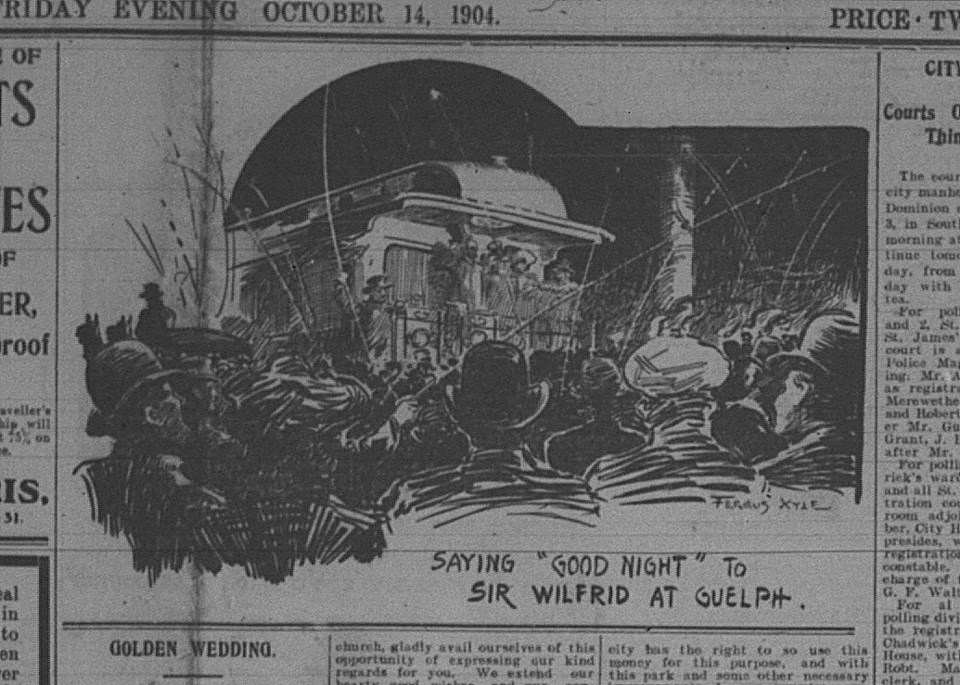In the evening of Oct. 12, 1904, as a large crowd waited in anticipation at the railway station, a special train from London rolled into Guelph. On board was Prime Minister Wilfrid Laurier, along with Lady Laurier and several federal government dignitaries.
It wasn’t Laurier’s first time in the Royal City. He had made stops in Guelph twice in the preceding eight years. But a visit by the Prime Minister of Canada was always a major event for a small city like Guelph – especially with an election coming up that November – and people turned out for it.
Heading the welcoming committee of leading citizens was Guelph MP Hugh Guthrie, a member of Laurier’s Liberal government. (During the First World War, Guthrie would cross the floor in the House of Commons and join Prime Minister Sir Robert Borden’s Conservative government after a falling-out with Laurier over the polarizing issue of military conscription.)
Laurier had been Prime Minister since July 1896 and would hold onto the position until losing an election in October 1911. In his 15 years in power, Laurier would be one of Canada’s most popular and successful prime ministers, and – in the opinion of some historians – Canada’s finest orator and greatest statesman.
Laurier was certainly held in high regard in Guelph, where, according to the local press, “It is difficult for Liberals to restrain their exuberance over the unprecedented success of the great Liberal demonstrations to Sir Wilfrid Laurier at the Royal City last evening.”
The “beloved chief of the Canadian people” was scheduled to speak at city hall and at the Royal Opera House. A crush of people packed the area around the platform in front of city hall, which was resplendent with flags and bunting. The Opera House was jammed “from pit to roof.” There were as many people standing out front as there were seated inside. For his drive up Wyndham Street from one venue to the other, Laurier was accompanied by the city band and cheered by people who lined the sidewalks.
Inside the Opera House, Guthrie’s supporters chanted, “What’s the matter with Guthrie? He’s all right! Who’s all right? Guthrie!” Then they broke into prolonged applause when Lady Laurier and Mrs. Guthrie took their seats in a box.
Guthrie spoke first. He praised Laurier and defended his own performance as an MP against criticisms that had been made by his opponents. He said he was “sick and tired” of old, unproven charges that funds connected to a railway scandal had secretly been kept in a vault in Guelph. He said his “Conservative friends” knew the facts of the matter, “but have forgotten them.”
Following Guthrie were Minister of Customs William Paterson, senator James McMullen of North Wellington; A.W. Tyson, president of the South Wellington Reform Association, and then the Prime Minister.
Laurier paid tribute to the late Alexander Mackenzie, Canada’s second Prime Minister, and pointed out what he considered to be the flaws in the policies of the opposition Conservatives. He particularly took issue with Robert Borden’s position on railways, trade and tariffs, which were the principal concerns of the day. The construction of the Canadian National Railway (also known then as the National Transcontinental Railway) was viewed as much a monument to Laurier’s legacy as the Canadian Pacific Railway was to that of Sir John A. Macdonald. Laurier’s contribution to a plan to make the Grand Trunk Railway part of continental rail systems, thereby giving Guelph a more solid connection to world commerce, certainly helped to enhance his popularity in the Royal City.
When all the speeches were over, the crowd braved the chilly October night air to tell Laurier goodbye at the station. Then his train pulled away and he was off to his next destination.
Guelph had basked for another moment in the spotlight of national history.



